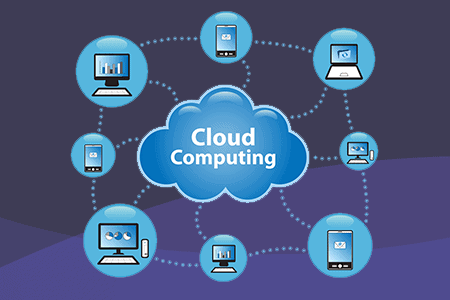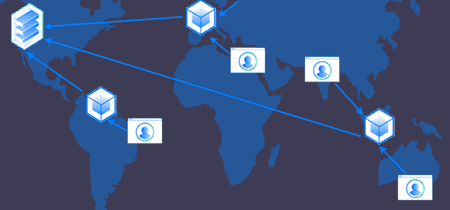If you’re curious about cloud hosting and content delivery networks, I’m willing to venture a guess that you’re looking to speed up your website, or make your app more efficient.
[displayAd]
In any case, let’s talk about the differences between cloud hosting and content delivery networks, because they are not the same thing. It’s understandable why people confuse them sometimes, but we’ll go over the differences and help you understand whether you need one of them, both, or maybe even neither.
Understanding Cloud Hosting
In the basic sense, the cloud in this context is storage and networking at an on-demand basis. You can scale your cloud hosting plan up and down quite easily with most providers. It’s usually just a matter of clicking a few buttons and selecting a larger hosting plan.

Your files will stay in the same data center. When you’re setting up a cloud host account, often you’ll be asked to choose from any number of data centers around the country or around the world. As such, people will still try to select one that’s close to their target audience, for minimal load times.
The differences between this, and using a CDN, will become apparent in just a moment.
What About a CDN?
Similar to cloud technology, we’re now talking about edge technology. A CDN is a collection of servers spread throughout a country, or even throughout the world. The CDN allows visitors to connect to your site more quickly because it will send them key files from the server that’s closest to them. A CDN means more people from various locations globally are able to access the fastest possible route to your site.

Think of the cloud as storage and networking on demand, usually in a locally decentralized network, and think of a CDN as a way to decentralize the files that are hosted on your cloud but doing so globally or at least nationally.
[displayAd]
Which Should You Use?
Deciding which one of these you should use for your website depends on a number of factors. Things to consider are the location of your visitors, if you’re able to get a solid hosting plan that’s local to the majority of your audience, what types of files you’re hosting on your site, how important speed is, and more.
If you have a static content site with articles and a few images, mainly just HTML and CSS as opposed to PHP and a MySQL database, then you really won’t need a CDN or any extremely fast tier of cloud hosting. An above-average server will be good enough.
If, however, you are running a large site with a lot of videos and other media to an audience around the world, it’s probably a good idea to opt for cloud hosting (so that you can scale up quickly as your site grows without any headaches), and a CDN as well (to help with hosting costs by carrying more of the bandwidth for the large files, and to keep things moving quickly for all of your visitors.)
The Goals of Cloud Hosting
Here’s a rundown of what cloud hosting aims to accomplish. Next, we’ll do the same for a CDN. Compare these to what your own goals are from a hosting platform, and you’ll have a pretty clear answer as to whether or not cloud hosting is right for you, and whether or not you should bother putting a CDN on top of it.
Of course, there are other options like non-cloud hosting, but that’s not a great choice for the vast majority of website owners these days, since technology has advanced without much of a leap in cost. Cloud hosting seeks to:
- Offer a scalable way to deploy and manage servers
- Provide redundancy in the event of hardware damage
- Be easier to manage as a platform
Think of it like “flexible hosting” with improved safety of your files, improved bandwidth management thanks to sharding, and the abliity to increase or decrease resources immediately in response to virality and bursts of traffic.
We’ve gone in-depth on the benefits of cloud hosting if you want to learn more.
[displayAd]
The Goals of Content Delivery Networks
As promised, here are the main reasons for using a CDN. Remember, this is an additional protocol on top of your regular server situation, meant to enhance you user’s experience, mainly regarding speed. A CDN seeks to:
- Decentralize the files you’re serving
- Speed up delivery of your website’s content
- Reduce CPU, RAM, and Bandwidth strain on your server
This isn’t always justified and it’s not cheap. If you have a local audience, your services and products aren’t of a high ticket value, or your website is speed optimized and streamlined enough with caching, you may not be able to warrant the price. It may even end up not being faster for your main users.
We’ve gone in-depth on the benefits of content delivery networks as well if you’re interested in digging deeper.
So, What’s Next the Next Move?
If you’re using old school shared hosting or another basic type of server, you should consider upgrading to cloud hosting. You’ll be able to find a plan that will meet your needs, and it’s easy to scale up or down as needed. We’ve covered the best cloud hosting providers in-depth to make it easy for you to make a decision.
If you’re not using a CDN on your site, this is another easy-win in terms of improving page speed and overall performance. A site that loads faster will get more visitors, one way or another. Check out the best CDN offerings available currently.
